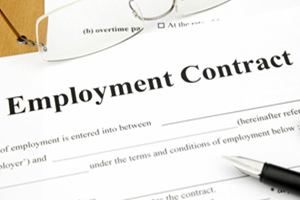By Mark Carey, Esq.
What do you mean I can be fired for any reason or no reason at all? Who made up this rule? Why do I have to follow the employment at-will doctrine? Well, you don’t, and there are several reasons companies and employees should shift to a modified approach that satisfies the expectations of both the employer and the employee.
Confusion about employment at-will
 Over the past 23 years I have handled employment law cases for both executives and employees. My clients are really confused and bewildered by the employment at-will rule, and about the significant financial impact it creates when employers decide to let them go.
Over the past 23 years I have handled employment law cases for both executives and employees. My clients are really confused and bewildered by the employment at-will rule, and about the significant financial impact it creates when employers decide to let them go.
Many clients say they understand the basic rule that they can be fired at any time (“at will”), and that they can leave a job at any time. But beyond that, they know absolutely nothing about why the rule came into being or, more importantly, how they can negotiate around it. When a termination occurs, the adverse impact of the rule becomes clear. They suffer from the break in their career trajectory and from the resulting financial uncertainty.
At the executive level, I routinely negotiate employment contracts that provide for termination “for cause” and “termination for good reason.” This is standard in the industry at the executive level. However, I also confront cases where the employer “shoves in” a provision identified as “termination for any reason.” If that sounds like the employment at-will rule, it is.
LeBron James has leverage
Enter the LeBron James Rule. (I made up this rule). Basketball superstar LeBron James can write his own ticket to work wherever he finds the highest bidder. He can demand that the “termination for cause” in his contract be accompanied by the “good reason provision” — and the latter must be accompanied by a severance payout. This makes the employer think twice about terminating an employee.
“Termination for cause” means you violated the law and company policies, so your employer can fire you without any severance. “Termination for good reason” means you can quit because the employer materially changed your title, for example, or your salary, reporting structure, or the location of your office — and the employer must pay you a guaranteed severance.
You might say not everyone is as fortunate as LeBron. I disagree, and this is what has bugged me for many years. Too often, our knee-jerk reaction is to accept this stupid and ill-conceived at-will rule. Some say, just be grateful you have your job. Give me a break! There is a new way to handle this.
The new LeBron James rule
I propose getting rid of the employment at-will rule and replacing it with the modified LeBron James form we see in executive employment contracts.
When negotiating a job offer, employees (not just executives and LeBron James) need to negotiate employment contracts into the deal. Employees need to identify their leverage factor and use it. That is, what makes you the most desirable hire for the job? This is what makes the employer throw higher pay, equity, or severance at the job candidate in order to induce you to accept a job offer. (See the Comments section in How to Say It: How ’bout some severance pay?)
Under the LeBron James rule, employees could be fired only for “cause,” and the employee could terminate employment for “good reason.” Further, if the good reason event occurs, then the employer must pay a severance amount to take care of some of the financial issues related to your transition to new employment. If you land a new job, your severance stops, as this is fair.
Find your leverage and do not be shy about asserting it.
Everybody wins
Here are several positive effects of eliminating the employment at-will rule based on my research into this issue.
- End the divide between Management vs. Everybody: Eliminating the employment at-will rule will get rid of the great divide between management and employees. Literally, this is the trust divide. If management scares employees into believing they can be fired any time, management is not creating a loyal and trusting environment. Trust spurs the kind of innovation and creativity that will push the company forward in profound economic ways. Employers want employees to be focused on their work, but the at-will rule distracts them and kills their motivation. The rule erodes any semblance of entrepreneurial creativity among the team. Employers need to seriously rethink this one.
- End the divide between HR vs. Everybody: Honestly, did you really believe the Human Resources (HR) department was there to help you? I make it my mission to point this out to every client I have. HR has a duty of loyalty to the employer. It has absolutely no interest in doing what’s right for you. By eliminating the employment at-will rule, HR will be aligned closer with employees and HR will do a better job of “caring” for the very employees that make up the company. Without employees, you have no company. Where did all those employers go astray?
- Eliminate the politics of fiefdoms: Does your boss play favorites? Do they hire from their own last place of employment? Are there any “brown-nosers” on the team who believe the only way to the top is to “work it” — what ever that means? Such are the politics of building fiefdoms. This behavior is childish and it’s irritating to say the least. You know what I am referring to. Why do some employees play along, and why do supervisors encourage it? Eliminating the employment at-will rule will breed meritocracy. Employees will begin to feel compassion for their co-workers and work more closely as a team or family, instead of putting a knife in one another’s back at work. All employees will work with management for the good of the company, and all will prosper together — not just executives with good contracts.
- Reduce Discrimination: If you create trust, honesty, transparency and vulnerability, then you create lasting relationships where employees want to stay and work. Employment discrimination bias arises from many reasons. My theory is that if you get rid of the employment at-will rule, you will gut the walls that employees build in their work environments with the sole goal of getting ahead. Think about it. When you direct negative words or behavior against another employee to make yourself look better in the eyes of your employer, you will do it to get ahead. That negative comment or behavior could be motivated by differences in gender, age, race, or religion, or it might involve manipulation like seeking sexual favors in exchange for career advancement. We need a sea change to correct our current direction. The status quo just doesn’t work anymore, except perhaps for employment attorneys like myself as we are very busy policing this garbage. If we eliminate the employment at-will rule and we give you employment protections, when you see something, you will feel empowered to say something. You will be protected if you have the courage to speak out.
A Special Case: Older workers
 Finally, here is my shout-out to older employees. Employers like to say, “We honor your wisdom and experience, you are worth every penny we pay you.” Many employees who are in their fifties and even sixties are well paid because they have many years of experience to offer, more than someone twenty years their junior. Some get fired (or not hired) simply because of their age.
Finally, here is my shout-out to older employees. Employers like to say, “We honor your wisdom and experience, you are worth every penny we pay you.” Many employees who are in their fifties and even sixties are well paid because they have many years of experience to offer, more than someone twenty years their junior. Some get fired (or not hired) simply because of their age.
I say we should apply our new rule to keep older employees on board. (See Age 70, working and job hunting again.)
We should focus on the positive economic impact these older, wiser employees can create for the company. Management must stop using the at-will employment excuse to terminate baby boomers because this abhorrent practice is not financially sound and never was to begin with. It’s like a bad drug addiction. Remember, wisdom still is a virtue for a reason.
Job security pays
When will we see elimination of the employment at-will rule? When management realizes they can make greater revenue multiples by providing better job security. They will have to stop listening to management-side defense lawyers who lobby incessantly to maintain the employment at-will rule for every client. The world isn’t flat, but we believed it was until someone showed us it wasn’t. The same goes here.
Management should adopt this new LeBron James rule and maybe — just maybe — they will finally see that #employees_matter.
Mark Carey is an employment attorney at Carey & Associates, P.C. in Connecticut. He can be reached at mcarey@capclaw.com and at (203) 984-5536.
: :


